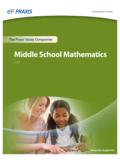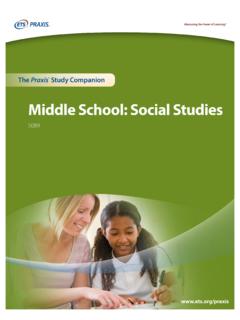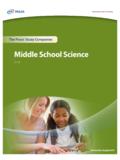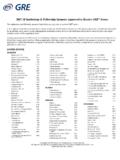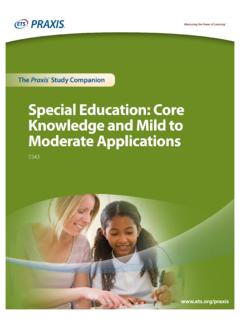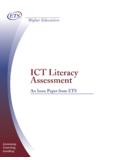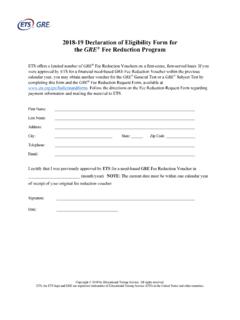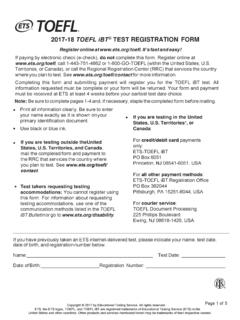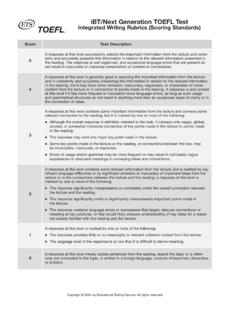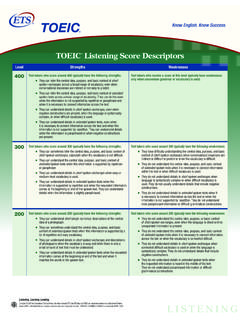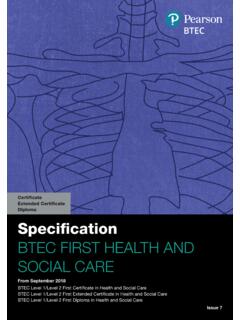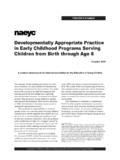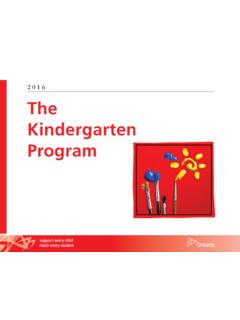Transcription of Elementary Education: Content Knowledge for Teaching …
1 Elementary education : Content Knowledge for Teaching Praxis Study CompanionThe Praxis Study Companion2 Welcome to the Praxis Study CompanionWelcome to The Praxis Study Companion Prepare to Show What You KnowYou have been working to acquire the Knowledge and skills you need for your Teaching career. Now you are ready to demonstrate your abilities by taking a Praxis test. Using the Praxis Study Companion is a smart way to prepare for the test so you can do your best on test day. This guide can help keep you on track and make the most efficient use of your study Study Companion contains practical information and helpful tools, including: An overview of the Praxis tests Specific information on the Praxis test you are taking A template study plan Study topics Practice questions and explanations of correct answers Test-taking tips and strategies Frequently asked questions Links to more detailed informationSo where should you start?
2 Begin by reviewing this guide in its entirety and note those sections that you need to revisit. Then you can create your own personalized study plan and schedule based on your individual needs and how much time you have before test in mind that study habits are individual. There are many different ways to successfully prepare for your test. Some people study better on their own, while others prefer a group dynamic. You may have more energy early in the day, but another test taker may concentrate better in the evening. So use this guide to develop the approach that works best for Teaching career begins with preparation. Good luck!Know What to ExpectWhich tests should I take? Each state or agency that uses the Praxis tests sets its own requirements for which test or tests you must take for the Teaching area you wish to you register for a test, confirm your state or agency s testing requirements at are the Praxis tests given?
3 Praxis tests are given on computer. Other formats are available for test takers approved for accommodations (see page 129).The Praxis Study Companion3 Welcome to the Praxis Study CompanionWhat should I expect when taking the test on computer?When taking the test on computer, you can expect to be asked to provide proper identification at the test center. Once admitted, you will be given the opportunity to learn how the computer interface works (how to answer questions, how to skip questions, how to go back to questions you skipped, etc.) before the testing time begins. Watch the What to Expect on Test Day video to see what the experience is and when are the Praxis tests offered?You can select the test center that is most convenient for you. The Praxis tests are administered through an international network of test centers, which includes Prometric Testing Centers, some universities, and other locations throughout the schedules may differ, so see the Praxis web site for more detailed test registration information at The Praxis Study Companion4 Table of ContentsTable of ContentsThe Praxis Study Companion guides you through the steps to success1.
4 Learn About Your Test ..5 Learn about the specific test you will be taking2. Familiarize Yourself with Test Questions ..30 Become comfortable with the types of questions you ll find on the Praxis tests3. Practice with Sample Test Questions ..33 Answer practice questions and find explanations for correct answers4. Determine Your Strategy for Success ..78 Set clear goals and deadlines so your test preparation is focused and efficient5. Develop Your Study Plan ..81 Develop a personalized study plan and schedule6. Study Topics ..85 Detailed study topics with questions for discussion7. Review Smart Tips for Success ..127 Follow test-taking tips developed by experts8. Check on Testing Accommodations ..129 See if you qualify for accommodations that may make it easier to take the Praxis test9.
5 Do Your Best on Test Day ..130 Get ready for test day so you will be calm and confident10. Understand Your Scores ..132 Understand how tests are scored and how to interpret your test scoresAppendix: Other Questions You May Have ..134 The Praxis Study Companion5 Step 1: Learn About Your Test1. Learn About Your TestLearn about the specific test you will be takingElementary education : Content Knowledge for Teaching (7811)Test at a GlanceTest Name Elementary education : Content Knowledge for Teaching (CKT )Test Code 7811 Total Time 4 hours, 45 minutes (four separately timed subjects)Format Selected-response and numeric-entry questions; an on-screen four-function calculator is provided. The Reading and Language Arts subtest may include questions with an audio delivery Computer delivered Subtest Subtest Subtests Length (Minutes) Length (Questions) 7812 Reading and 90 63 Language Arts CKT 7813 mathematics CKT 85 52 7814 Science CKT 60 47 7815 Social Studies CKT 50 60 Elementary education : Content Knowledge for TeachingReading andLanguage Arts CKT SubtestMathematicsCKT SubtestScience CKT SubtestSocial StudiesCKT SubtestAbout This TestThe purpose of this test is to assess whether the prospective Elementary teacher has the Content Knowledge needed at the time of entry to the profession in the areas of reading and language arts, mathematics , science, and social studies.
6 It is designed for teacher candidates seeking a generalist Elementary school Content covered in each of the four subtests is described in the following four subtests Reading and Language Arts, mathematics , Science, and Social Studies are CKT assessments. CKT stands for Content Knowledge for Teaching . (See About the CKT Subtests. ) The questions in these subtests reflect a new approach to identifying and measuring the Content Knowledge that teachers need. While assessing Knowledge of the Content that Elementary students will learn, the CKT subtests focus on the kind of specialized Knowledge of Content that a teacher will apply to specific tasks of Teaching , such as selecting an appropriate graphic organizer to support students in a particular reading task or interpreting a student s mathematical misunderstanding based on a pattern of test may contain some questions that will not count toward your Praxis Study Companion6 Step 1: Learn About Your TestAbout The CKT SubtestsThe subtests in mathematics and in reading and language arts were developed through a partnership between the Educational Testing Service and TeachingWorks at the University of Michigan.
7 These tests draw on the theoretical framework of Content Knowledge for Teaching , grounded in over 25 years of research, which identifies a type of professional Content Knowledge used only in Teaching . Research evidence links this specialized Content Knowledge to improved Content Teaching and to positive learning outcomes for students. Most questions on the CKT subtests have a Content dimension and a task-of- Teaching dimension. They measure the specialized Content Knowledge that a teacher needs about a particular Content topic ( , comparison of fractions) in order to carry out a Content -specific task of Teaching ( , evaluating a mathematical explanation). The tasks of Teaching are based on the work teachers need to do in the Content areas to implement high-leverage practices (HLPs) identified by TeachingWorks.
8 HLPs are practices teachers use regularly across all subject areas and grade levels that are critical to helping students learn important Content . For more information about TeachingWorks and HLPs, see For a CKT overview, see Deborah Loewenberg Ball, Mark Hoover Thames, and Geoffrey Phelps, Content Knowledge for Teaching : What Makes It Special? Journal of Teacher education 59, no. 5 (2008): Praxis Study Companion7 Step 1: Learn About Your TestElementary Education: Reading and Language Arts CKT(7812) Time: 90 minutes; Format: Selected response and numeric entryIIIIIIA bout This SubtestThis subtest focuses on the essential Content Knowledge needed for Teaching Elementary reading and language arts. The 60 one-point questions and 3 two-point questions measure two kinds of Content Knowledge .
9 The first kind is the Content Knowledge needed to do the work of the student curriculum, such as identifying the details in a passage that support the main idea. Approximately 20 percent of the questions measure this kind of Content Knowledge . The second kind is the specialized Content Knowledge needed to teach the student curriculum; this is the Knowledge a teacher would use, for instance, when choosing the most appropriate graphic organizer to help students identify the supporting details for a main idea. This specialized Content Knowledge is not Knowledge that students are expected to learn, nor is it general Knowledge of classroom management strategies or learning theory; it is Content Knowledge specialized to the work of Teaching Elementary reading and language arts. Approximately 80 percent of the questions measure this kind of Content question focuses on specific reading and language arts Content (listed in Content Topics ).
10 Questions that measure specialized Content Knowledge also incorporate a particular task of Teaching (listed in Tasks of Teaching English Language Arts (ELA) ); these questions are intended to measure the specialized Content Knowledge needed to carry out the task are descriptions of the three sections that follow: Tasks of Teaching English Language Arts (ELA), Content Topics, and Measuring Content Knowledge in Practice. Tasks of Teaching English Language Arts (ELA) lists ten tasks that are a routine part of Elementary reading and language arts instruction. These tasks are based primarily on certain high-leverage practices (HLPs) identified by TeachingWorks. They were developed by ETS and TeachingWorks and confirmed by a national committee of Elementary teachers and teacher educators as being among the most essential tasks for effective Teaching of Elementary reading and language arts Content .
